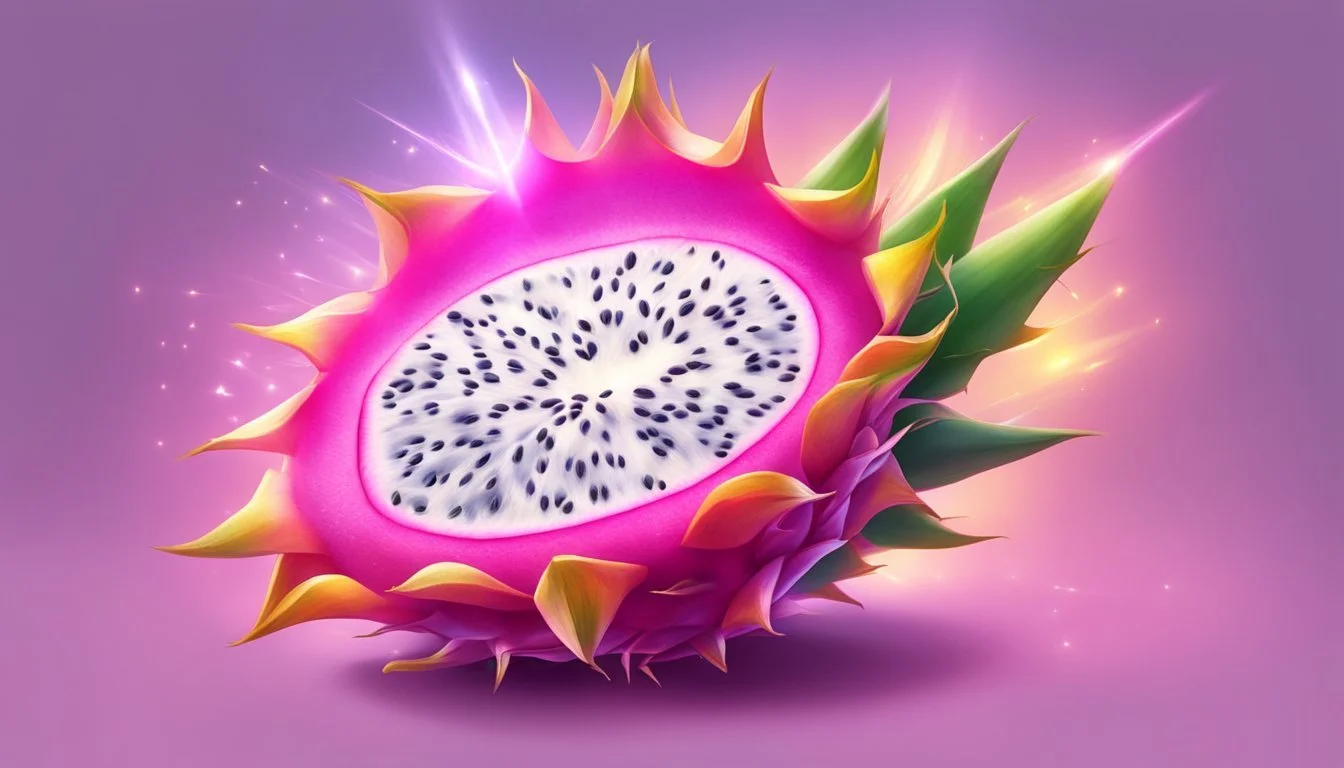What Are the Health Benefits of Pitaya?
Unveiling the Nutritional Powerhouse
Pitaya, commonly known as dragon fruit, distinguishes itself in the fruit world with its vibrant hues and unique appearance. This tropical fruit, hailing from a family of cacti, is not only aesthetically striking with its bright pink skin and speckled flesh but it is also celebrated for its considerable nutritional value. Dragon fruit is low in calories and offers an array of vitamins and minerals that contribute to its health-promoting properties.
The flesh of dragon fruit is rich in antioxidants such as vitamin C, which plays a crucial role in immune system support. Its high vitamin content, combined with the presence of fiber, aids in maintaining healthy digestion and can contribute to weight management. Dragon fruit's nutritional profile doesn't end there; it's also a source of iron, which is essential for transporting oxygen throughout the body and supporting overall energy levels.
Furthermore, the health benefits of pitaya extend to aiding in blood sugar regulation, making it a fruit of interest for those managing diabetes. Its flavonoids and fiber content have been studied for their potential in lowering the risk of heart disease and maintaining healthy cholesterol levels. With its unique taste and texture, dragon fruit is more than just a pretty face in the world of produce; it's a nutritional powerhouse that supports a wide range of bodily functions.
Nutritional Profile
Pitaya, commonly known as dragon fruit, stands out in the produce aisle not just for its unique appearance but also for its wealth of nutrients that confer various health benefits.
Majestic Array of Vitamins and Minerals
Dragon fruit is esteemed for its rich assortment of vitamins and minerals, providing a substantial nutritional value in a low-calorie package. It boasts a high content of vitamin C, essential for immune function and skin health, and vitamin B2 (riboflavin), which aids in energy production. Magnesium, found in noteworthy amounts, plays a role in numerous biochemical reactions in the body, including nerve function and bone health. Pitaya provides a good source of iron, necessary for blood production, and calcium, critical for bone strength. The presence of antioxidants like flavonoids and betalains contributes to its potential anti-inflammatory and anticancer attributes.
Nutrient: Vitamin C, Benefit: Immune support, skin health
Nutrient: Riboflavin (B2), Benefit: Energy production
Nutrient: Magnesium, Benefit: Nerve function, bone health
Nutrient: Iron, Benefit: Blood production
Nutrient: Calcium, Benefit: Bone strength
Nutrient: Antioxidants, Benefit: Anti-inflammatory, potential anticancer
Caloric Composition
Dragon fruit is low in calories, making it a desirable option for individuals seeking to enjoy a flavorful treat without an excessive caloric intake. Despite its low energy content, it is high in fiber, which aids digestion and contributes to satiety. Concerning macronutrients, pitaya provides a modest amount of protein and carbohydrates, with negligible fat content. The carbohydrates in dragon fruit include natural sugars, which provide a quick energy source.
Calories: Low
Fiber: High
Protein: Modest
Carbohydrates: Natural sugars
Fat: Negligible
This detailed examination of dragon fruit's nutritional composition makes it evident that this exotic fruit is not only a visual delight but also a bountiful source of vital nutrients.
Health Benefits of Pitaya
Pitaya, also known as dragon fruit, is recognized for its vibrant hue and spiky exterior, but its benefits extend beyond visual appeal. As a fruit rich in nutrients, pitaya offers a wealth of health benefits ranging from enhancing the immune system to supporting digestion and managing blood sugar levels.
Immune System Support
Pitaya is a good source of vitamin C, which is essential for the immune system's function. This antioxidant plays a key role in defending the body against pathogens and can help reduce the risk of chronic diseases. The fruit also contains other antioxidants that protect against free radical damage, potentially lowering the risk of health complications.
Digestive Health and Gut Balance
With its high dietary fiber content, pitaya aids in maintaining a healthy digestive system. Fiber promotes bowel regularity and may help prevent constipation. Additionally, this fiber acts as a prebiotic, which supports gut bacteria balance crucial for good digestion and overall gut health.
Blood Sugar and Cholesterol Management
Pitaya's fiber content is beneficial for managing blood sugar levels, which is particularly relevant for individuals with type 2 diabetes. The fiber can slow the absorption of sugar, helping to avoid spikes in blood sugar levels. There is also evidence that the consumption of pitaya can contribute to lowering the risk of heart disease by improving cholesterol profiles, reducing levels of low-density lipoprotein (LDL), and potentially helping reduce inflammation which is linked to heart health.
Incorporating Pitaya into the Diet
The vibrant pitaya, or dragon fruit, can be a beneficial addition to diets, enriching meals with dietary fiber and a variety of vitamins. Here are effective ways to weave this exotic fruit into everyday eating habits.
Creative Culinary Uses
Salads: Pitaya's mild sweetness makes it an excellent companion to greens. Chunks or balls of ripe dragon fruit add a pop of color and nutrition to a salad.
Smoothies and Juices: Blending frozen or fresh pitaya into smoothies or juices injects a rich supply of antioxidants. A simple pitaya smoothie might include:
1 fresh or frozen pitaya
1 banana
½ cup of your choice of milk or juice
A handful of ice
Blend until smooth for a refreshing and nutrient-packed beverage.
Snacks and Yogurt: Cubed pitaya serves as a satisfying snack on its own. When added to yogurt, it provides an extra layer of texture and boosts fiber intake.
Fruit Salads: Tossing cubed dragon fruit into a fruit salad not only enhances the nutrient profile but also the visual appeal.
Preparation and Selection Tips
When preparing pitaya, begin with selecting a ripe fruit—it should give slightly under pressure. Slicing the fruit lengthwise and scooping out the flesh is a standard method of preparation. Pitaya can be enjoyed:
Fresh — cut into cubes for immediate consumption.
Frozen — slice and freeze the flesh for a chilled addition to smoothies or as a cold snack.
Dried — thinly slice and dehydrate for a chewy, concentrated flavor that's portable.
Incorporating pitaya into one's diet can be seamless and enjoyable, supporting a healthy and balanced nutritional intake.
Frequently Asked Questions
This section addresses common inquiries about the specific health benefits associated with pitaya, also known as dragon fruit, and its consumption.
What are the potential health advantages of consuming pitaya seeds?
Pitaya seeds are rich in omega-3 and omega-6 fatty acids, which contribute to cardiovascular health. They also contain a good amount of fiber that aids in digestion.
How does pitaya juice contribute to overall wellness?
Drinking pitaya juice provides a concentration of the fruit's vitamins and antioxidants, supporting the immune system and potentially reducing the risk of chronic diseases.
What are the specific benefits of dragon fruit for women's health?
Dragon fruit is high in iron, which is essential for women, especially those of childbearing age. The vitamin C present in dragon fruit improves iron absorption, which is beneficial for preventing anemia.
Can consuming dragon fruit aid in weight management?
Dragon fruit is low in calories and high in fiber, which can help to keep one feeling full for longer periods, potentially aiding in weight management efforts.
What are the skin health benefits associated with dragon fruit consumption?
The high antioxidant content in dragon fruit, including vitamin C, may contribute to skin health by protecting against damage from free radicals and aiding in collagen production.
Are there particular groups of people who should avoid consuming dragon fruit?
Generally, dragon fruit is safe for most individuals. However, those with known allergies to other fruits, especially those in the cactus family, should approach dragon fruit with caution and consult a healthcare provider if they are concerned.





